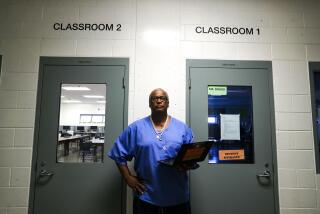The Graduate : Girl Stays Behind Bars for Diploma
- Share via
Nine months ago, Sandra Leavy finished her sentence at Camp Scott, a county probation center in Saugus. She could have stepped outside, free to hang out on the streets of Long Beach with local toughs, as she had in the past.
Instead she chose to remain inside the gates to complete her high school education.
Her decision drew laughter from other girls at the camp, but Leavy stuck to her studies. She received special permission to work part time at a fast-food restaurant, but each night Leavy returned to the camp and was confined to her dormitory.
In a small but spirited ceremony Thursday afternoon, Leavy’s perseverance was rewarded. As a woman played “Pomp and Circumstance” on an electric piano and the boys chorus from nearby Camp Scudder sang “We Are the World” and “Lean on Me,” Leavy and two other graduates smiled proudly. Wearing a green graduation cap and gown, Leavy received her high school diploma and exhorted the other students to “get your life together. Try to accomplish something.”
The new graduate plans to study computer science this spring at a community college in Riverside, she said Thursday as she prepared for her release from the camp.
“I’ve waited a long time for this,” Leavy, 17, said after the ceremony. “A lot of girls called me stupid for staying. I still had to follow the rules, but I liked that because it taught me the discipline I needed to learn.”
Leavy feared that if she left before graduation she would drift back into unlawful activities--and face more severe punishment. “I felt like I’d rather stay at the camp for nine more months than be locked up for the rest of my life,” she said.
Three-year-old Camp Scott, which houses 90 girls, age 13 to 18, had never before had a youth ask to remain beyond her sentence to complete her education, said Mary Dederick, camp director.
“Sandra is a shining example of what you can be if you put your mind to it,” Dederick told youngsters from Camp Scott and Camp Scudder during the ceremony.
Leavy said she had a troubled childhood because of her mother’s frequent run-ins with the law. Her early education was spotty. “I was in Juvenile Hall or running on the streets,” she recalled. “I never had time to go to school.”
During the past 10 years, Leavy lived mainly in foster homes and detention centers because of truancy, and as she got older, drug offenses. In June, 1988, she was assigned to Camp Scott. In addition to their schoolwork, girls are required to undergo counseling and work on forestry projects.
“She was a challenge,” said teacher Patty Crouse-Claude. “She had an aggressive, assertive attitude toward adults and other students. She has become calmer, more in control, more determined, more organized and a much nicer young lady. She’s growing socially as well as intellectually. I think she’ll do well in college.”
Despite her limited early education, Leavy earned mostly A’s at the camp’s school. “She challenges herself,” Crouse-Claude said. “She won’t accept anything lower than an A.”
Leavy’s education included an introduction to high-tech equipment. “I love computers,” she said. “Once I learned how to type on them, I didn’t want to stop.”
Diploma in hand, Leavy plans to move in with her uncle’s family in Riverside and begin college. She stands by her decision to stay at Camp Scott until graduation. “Here, I had to learn,” she said. “There wasn’t any other option to take.”
More to Read
Sign up for Essential California
The most important California stories and recommendations in your inbox every morning.
You may occasionally receive promotional content from the Los Angeles Times.













